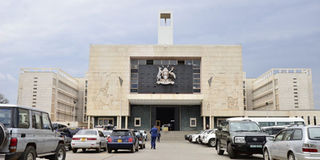Naads, government agencies fail to spend Shs350b

Named. Parliament returned Shs27b to the Treasury after failing to utilise it in the last financial year. photo by Alex Esagala
A number of government agencies, including the National Agricultural Advisory Services (Naads) and Parliament, have returned a record Shs350b to the Treasury after failing to absorb it in the ended Financial Year.
In interviews conducted yesterday, officials of the affected institutions attributed their failure to spend the cash to ongoing projects pending certification for payment and departure of staff.
The list, for instance, shows that Naads, which the government dangled as a magic bullet to fix bottlenecks in the agricultural sector, the largest employer of Ugandans, returned nearly Shs40b to the Consolidated Fund.
Parliament took Shs27b back to the Treasury while the Petroleum Authority of Uganda (PAU) returned Shs16.5b.
Others are Uganda National Roads Authority (Unra), Shs3.4b, Mulago National Referral Hospita (Shs5.5b), Energy ministry (Shs9b) and Immigration directorate (Shs4.3b).
The last Financial Year ended on June 30, and the Public Finance Management Act, 2015, provides that government ministries, departments and agencies (MDAs) that would not have spent the disbursed funds by the deadline, return it to the Treasury.
The Shs350b dwarfs the Shs22.4b sent back to the Consolidated Fund in the previous Financial Year.
Shs210b of the Shs350b was allocation to central government while Shs139.5b was vote for local governments, according to computation by the office of the Accountant General, Mr Lawrence Semakula.
The unspent money means taxpayers were deprived of services they were entitled to, lowering the quality of life or imposing on them the liability to enjoy those services at personal cost.
Mr Semakula said affected activities included salaries, pension and gratuity, except for Naads where up to Shs37b was for development expenditure.
“For Naads you might wonder, why you return all that money because it was for agricultural inputs which were never bought,” he said.
Unspent wage and salary money arises because unverified pensioners and staff that have exited government service or those that were planned for, but not recruited, cannot be paid, he said.
“This is why the money is returned,” Mr Semakula said.
Mr Ben Kumumanya, the Local Government ministry permanent secretary, warned in January that accounting officers who return money to the Consolidated Fund will be punished.
“This is a management decision taken at the ministry after seeing that some districts and municipalities return money at the end of every financial year even when services are not delivered,” he said.
In spite of the warning, districts returned Shs139.5b and it remains unclear how their parent ministry will act.
Mr Semakula said districts fail to absorb funds due to lack of capacity.
“Some issues relate to infrastructure constraint especially where new districts are yet to be enrolled on the Integrated Finance Management System, an automated government payment system,” he said.
AFFECTED INSTITUTIONS RESPOND
Chris Obore, Parliament spokesperson: “That money was meant for ROKO Constructions company as partial payment for ongoing works, but they have not yet reached the stage for payment because there is no certificate.”
Jacob Siminyu, Immigration spokesperson: “Get the comment from the Accountant General because that is not our report.”
Robert Kasande, Energy Permanent Secretary: “The biggest portion of that money, Shs5.5b, was meant for salaries but we were unable to spend it because most of our staff moved to other agencies.”
Ernest Rubondo, Executive Director, Petroleum Authority of Uganda: “The funds were meant to support recruitment of staff and monitor activities in the oil fields, but they were sent very late. The law does not allow you to recruit until you have funds; so, that is partly why we were unable to absorb them.”
Additional reporting by URN




